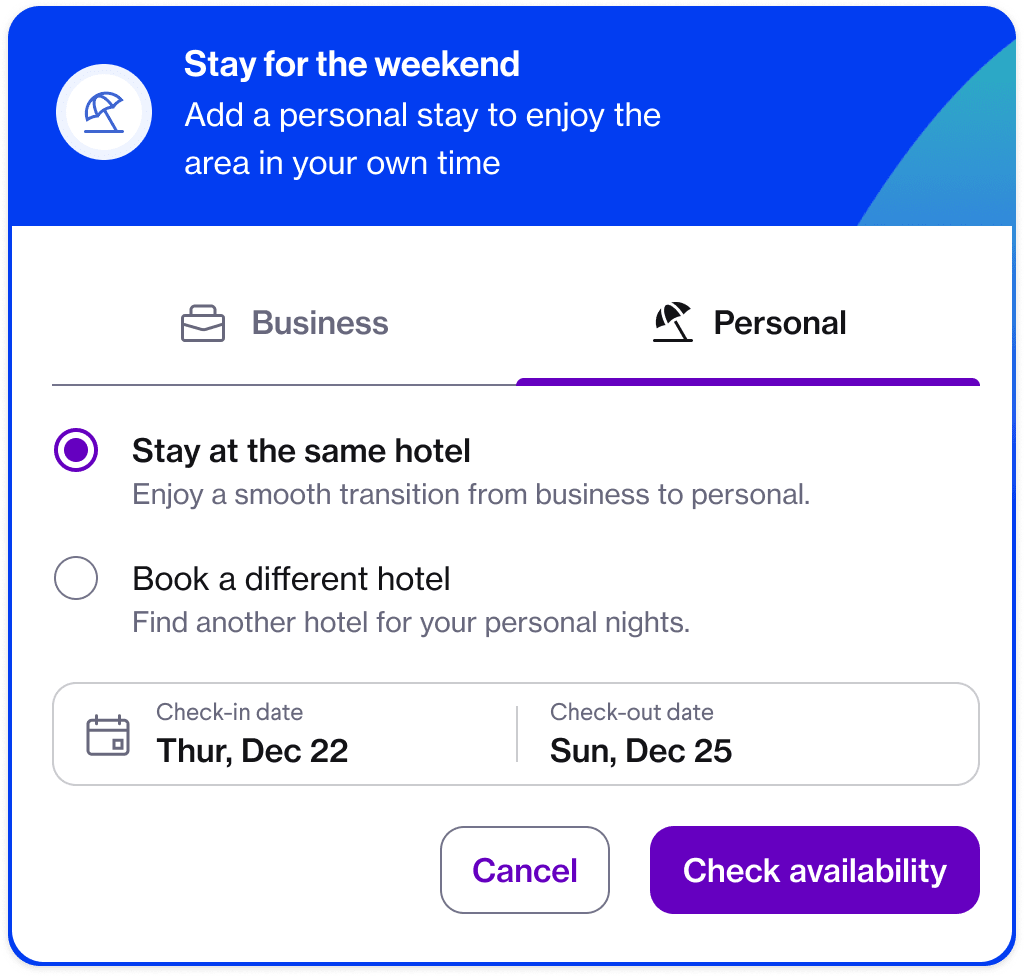The Ultimate Guide to Bleisure Travel Policies

In the ever-evolving landscape of employee benefits and work-life balance initiatives, there’s a rising trend that has caught the attention of forward-thinking organizations: bleisure travel.
Combining business and leisure travel allows employees to extend their business trips to explore new destinations, relax, and recharge. Beyond the obvious advantages for traveling employees, there are some surprising benefits for companies that incorporate a leisure travel policy into their travel program.
In this article, we’ll explore those benefits and some pitfalls to avoid before diving into what companies should include in a bleisure travel policy.
Today’s Bleisure Travel Market
The global bleisure market was estimated at $315.3 billion globally in 2022 and is expected to more than double to reach $731.4 billion globally by 2032. See more bleisure travel statistics.
What is a Bleisure Travel Policy?
A bleisure travel policy is a component of a company’s overall corporate travel policy that explains guidelines for adding leisure extensions to business trips. This type of policy recognizes that employees may want to take advantage of the opportunity to explore a destination before or after their work-related commitments have concluded and provides parameters for blending work and leisure travel into a single trip.
Benefits of Bleisure Travel for Companies
1. Boosts Employee Satisfaction and Retention
In today’s competitive talent market, attracting and retaining top talent is essential. Offering a bleisure travel policy strongly conveys to employees that the company values their well-being and work-life balance.
Consider these recent statistics from business travelers:
- 89% desire to add some leisure time to their next business trip
- 76% have already combined business and leisure travel
- 44% have turned down work trips due to a lack of leisure time at the destination
By enabling employees to integrate leisure activities into their business trips seamlessly, companies can empower employees to create memorable experiences and make the most of their time away from home. This increases job satisfaction and leads to higher employee retention rates, ensuring continuity and stability within your organization.
What Companies Are Saying
“Every perk counts in this current hiring environment, especially when hiring creators who are in such high demand. … I would say, especially for people of my generation, a perk that encourages and simplifies travel matters more than anything else.” –Mike McGee, Vice President of Finance, VaynerMedia
2. Fosters Innovation and Creativity
CEOs consistently rate creativity as the most essential trait for incoming employees, and research shows that exposure to new and diverse experiences, such as those frequently encountered during travel, can lead to fresh ideas and insights.
Travel is a catalyst for inspiration and fresh perspectives. Companies can create an environment that nurtures creativity and innovation by encouraging employees to explore new destinations and immerse themselves in different cultures.
The experiences gained during bleisure travel can spark new ideas and approaches, infusing a sense of excitement and curiosity into employees’ work. This injection of fresh perspectives can drive breakthroughs and help your company stay ahead in today’s rapidly evolving business landscape.
3. Enhances Work-Life Balance
The line between work and personal life has become increasingly blurred in our hyper-connected world. A bleisure travel policy acknowledges the importance of work-life balance by allowing employees to prioritize personal well-being while fulfilling their professional responsibilities.
Business travelers clearly understand the connection between work-life balance and business-leisure trips. Recent surveys have shown that:
- 55% plan to take more bleisure trips specifically to improve work-life balance
- 78% agree that adding leisure days adds value to work assignments
- 73% think bleisure opportunities benefit them as employees
By encouraging employees to take personal time for themselves during business trips, companies can foster a healthier work environment and reduce stress and burnout.
The result? A more engaged, energized, and productive workforce.
4. Showcases an Innovative Company Culture
The benefits of adding leisure travel parameters to a company’s travel policy extend beyond employee satisfaction and retention; they also position your organization as an innovative leader in the modern workplace.
Companies that embrace bleisure travel clearly communicate that they are forward-thinking and willing to challenge traditional norms. This positioning can be a valuable differentiator in attracting top talent, particularly among younger generations who prioritize experiences and work-life integration.
By adopting a bleisure travel policy, you position your company as an employer of choice, attracting ambitious individuals seeking a holistic career approach.
Understanding Generational Differences
5. Saves Company Money
By allowing employees to add leisure extensions, companies may be able to save on their travel program.
- Airfare: Airfare costs tend to surge on popular travel days, like early in the week when business travelers typically depart. By extending their trip, a traveler could fly on a less-popular — and less-expensive — day.
- Accommodations: Since 82% of bleisure travelers stay at the same hotel for both the business and leisure portions of their trips, it stands to reason that they would be more economical with their choices.
There are other difficult-to-quantify advantages to company budgets as well. Considering that overworked employees are prey to fatigue, poor health, and stress, implementing a bleisure travel policy could alleviate company health care costs or the cost of replacing employees who leave the company. One study predicted that every time a business loses a salaried employee, recruiting and training someone new costs the equivalent of 6 to 9 months’ salary.
Bottom line: Allowing employees to extend their trips can provide additional value to companies at no additional cost.
Leisure Extension Pitfalls to Avoid
In a world where work and personal lives are increasingly intertwined, a bleisure travel policy represents an opportunity to redefine the traditional boundaries of business trips. But the blending of business and leisure trips could have some potential downsides.
- Blurry Expense Boundaries: Determining which expenses are eligible for reimbursement can become complicated, making expense management more difficult and slowing down the expense report process.
- Misuse of Resources: Employees may accidentally (or purposefully) use company resources for personal activities, transportation, accommodations, or meals.
- Operational Challenges: Additional coordination with travel agencies, airlines, and hotels could be required, leading to logistical challenges or increased costs.
- Risk Management: Companies are responsible for ensuring their employees' safety and well-being during business trips. If employees engage in leisure activities that are riskier in nature, it could pose potential liability issues for the company.
- Legal Implications: Depending on the destination and length of the trip, there could be issues related to work visas, taxes, and insurance.
- Misuse of Company Time: Some employees might use the pretext of a business trip to take a vacation or fail to fully engage in business-related matters throughout the trip.
To address these pitfalls, companies that allow leisure extensions on business trips often establish clear policies and guidelines that outline what is permissible, how to handle expenses, and any expectations regarding work-related commitments.
Elements to Include in a Company Bleisure Travel Policy
A corporate travel policy must clearly outline rules for leisure extensions. This helps the traveler understand expectations regarding business expenses and behavior on the trip while limiting liability and risk for the organization.
A clear leisure travel policy should include these elements:
- Purpose and Scope: Start by defining the purpose of the policy and its scope; for example, outline that the policy covers employees’ leisure travel activities outside of work-related commitments.
- Eligibility and Leave Entitlement: Specify who is eligible for leisure travel and the amount of leave employees are entitled to for leisure travel.
- Approval Process: Include details on the manager approval process, including timeframe and leave request procedures if it’s necessary for the employee to use PTO (e.g., vacation days or personal days).
- Expense Parameters: State any parameters for spending that apply (or do not apply) to the leisure portion of the trip and any requirements for the expense reimbursement and reporting processes.
- Safety and Health Guidelines: Explain how to meet the duty of care and encourage travelers to adhere to travel advisories and health guidelines.
- Prohibited Activities: Identify any activities that may be prohibited, such as engaging in illegal drug use or any conduct that reflects poorly on the company.
- Blackout Periods: Define periods during which leisure extensions might be restricted due to peak business seasons or critical deadlines.
- Contact for Queries: Provide contact information for employees needing clarification about the travel policy.
Remember that policies vary based on the organization’s culture, industry, and geographic location. It’s crucial to involve relevant stakeholders, such as HR, legal, and senior management, in developing and reviewing the policy to ensure its effectiveness and compliance.
Combine Business and Leisure Travel with Navan
Navan makes it simple for employees to add extra days to business trips while ensuring that the line between work and play is clear-cut.

Employees who book business trips on Navan can seamlessly add extra nights to the same booking. Because payment is processed with a personal credit card, the business and personal expenses are clearly delineated.
Travelers can also take advantage of perks typically only available to corporate travelers. They can:
- Access direct and corporate-negotiated hotel rates
- Continue to earn air and hotel loyalty points
- Eliminate the need to manage multiple itineraries
- Get 24/7 support for personal travel
By empowering employees to blend work and leisure seamlessly, companies can improve the travel experience and create a culture that values employees’ well-being, fosters creativity, and promotes collaboration.
Ready to embrace the power of leisure extensions? Schedule a demo or get up and running with Navan in just 5 minutes.
Further Reading
More Resources for Travel Managers
- Why Bleisure Travel Is the New Employee Benefits Trend
- How Bleisure Is Changing the Travel Industry
- It’s Time for Companies to Embrace Leisure Travel Extensions
- Bleisure Travel Becomes Easier with Modern Spend Management Tools
More Resources for Business Travelers
This content is for informational purposes only. It doesn't necessarily reflect the views of Navan and should not be construed as legal, tax, benefits, financial, accounting, or other advice. If you need specific advice for your business, please consult with an expert, as rules and regulations change regularly.
More content you might like
Take Travel and Expense Further with Navan
Move faster, stay compliant, and save smarter.

